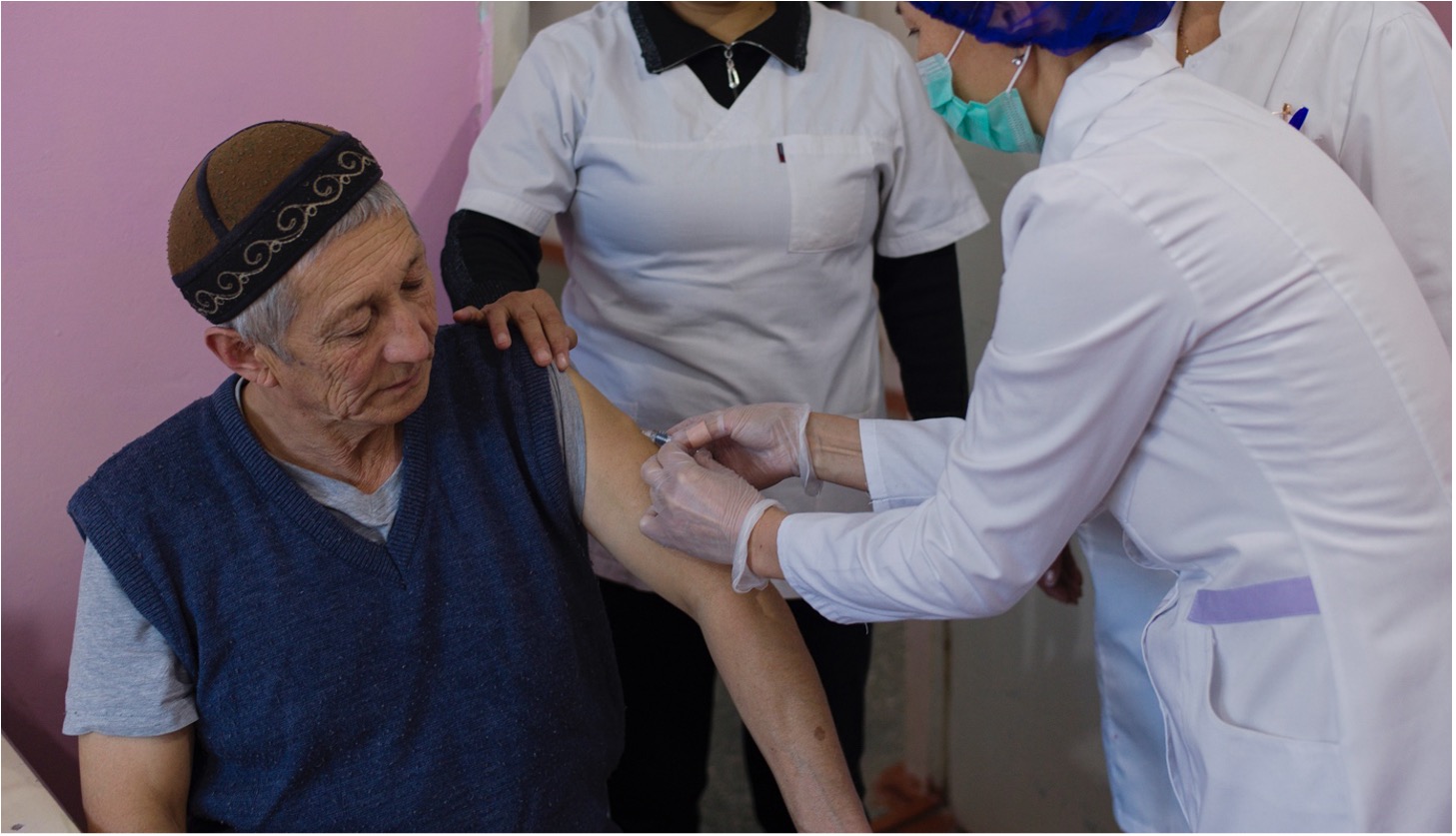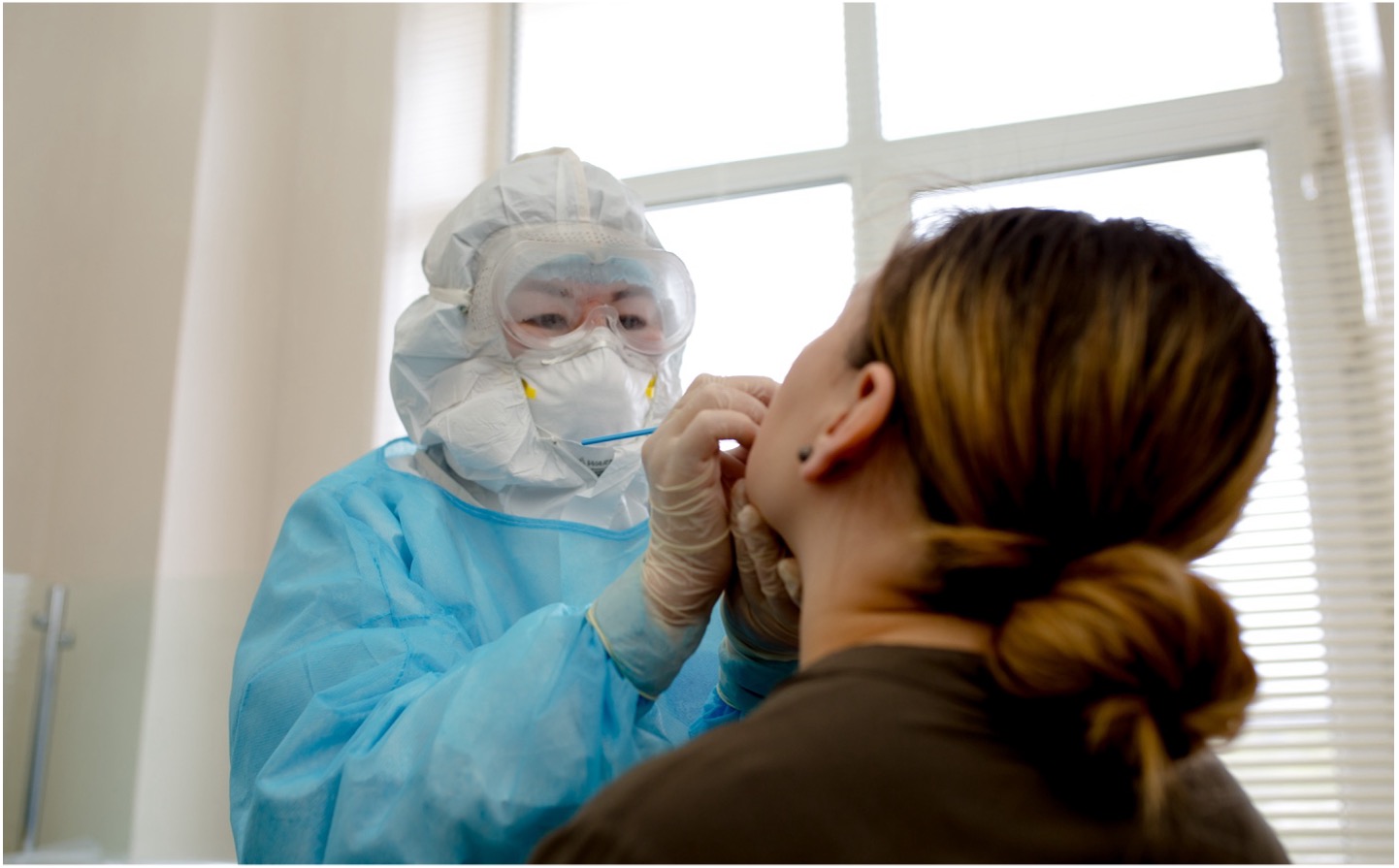Like most countries, Kyrgyzstan’s healthcare service delivery has been severely affected by the COVID-19 pandemic. Among others, the Global Fund to Fight AIDS, Tuberculosis and Malaria (GF), Gavi the Vaccine Alliance, Joint United Nations Programme on HIV/AIDS (UNAIDS), United Nations Development Programme (UNDP), United Nations Children's Fund (UNICEF), United Nations Population Fund (UNFPA), World Bank (WB) and World Health Organization (WHO) coordinated their actions to address various critical health issues identified by the government, such as reinforcing workforce capacity, increasing vaccination coverage and maintaining essential health services. Collaboration was enhanced through stakeholder consultations, high-level policy meetings, joint planning and resource mobilization. This collaboration aligns with commitments made by the agencies under the Global Action Plan for Healthy Lives and Wellbeing for All (SDG3 GAP) Action Plan for Healthy Lives and Wellbeing for All (SDG3 GAP). Activities undertaken during the pandemic have strengthened the country's primary healthcare (PHC) capabilities and its preparedness to respond to future crises.
Enhancing Vaccination Coverage and Equity through Closer Collaboration
By the end of 2021, Kyrgyzstan’s COVID-19 vaccination coverage remained considerably below the WHO global target of 70%, primarily due to vaccine hesitancy, political instability, and reorganization within the Ministry of Health (MoH). Gavi, UNDP, UNICEF, WB and WHO assisted the Government in securing vaccines through COVID-19 COVID-19 Vaccines Global Access (COVAX), direct procurement and donations. They facilitated national vaccine roll-out plans, strengthened supply chains and expanded vaccination points, including PHC clinics. In addition to COVID-19 vaccines, Gavi and WHO supported the MoH to rapidly expand mobile immunization teams for routine vaccinations. These teams conducted six rounds of visits, covering 88% of remote and hard-to-reach areas, reaching over 170,000 individuals. UNICEF supported improving cold-chain infrastructure and increased access to specialized refrigeration equipment at vaccine points from 49% to 85% nationwide (1). They also reached parents of 8000 under-vaccinated children and empowered 3000 members of 952 village health committees for advocacy on immunization.
 A 62-year-old man receives a dose of flu vaccine at the Nijnaya Serafimovka Center for the Elderly and Disabled in Chuy Oblast, Kyrgyzstan, 25 November 2022. © WHO / Arete / Maxime Fossat
A 62-year-old man receives a dose of flu vaccine at the Nijnaya Serafimovka Center for the Elderly and Disabled in Chuy Oblast, Kyrgyzstan, 25 November 2022. © WHO / Arete / Maxime Fossat
Mitigating Disruptions to Essential Health Services
By early 2020, HIV and TB service delivery, alongside many other essential health services fell behind due to the diversion of resources to COVID-19. To support the Government response, GF, UNAIDS and UNDP assisted in reaching TB patients and people living with HIV by introducing mobile teams and utilizing messaging applications for online counseling and referrals. UNAIDS-supported peer consultants remained in contact with people living with HIV, delivering medicine to their homes so they could stay on treatment during the lockdown, distributing food packages and providing psychological support.
"Working as a peer consultant has given me an opportunity to help people to overcome their problems, many of which I have come across myself in the past," said Toktonalieva, a peer consultant.
Complementing those efforts, UNFPA, UNICEF and WHO collaborated with the Government to conduct health surveys which revealed reduced availability of essential sexual, reproductive, maternal, neonatal and child health services due to restricted movement during lockdowns. UNICEF and the MoH piloted a project in select communities that introduced a model for postpartum home visit services coupled with teleconsultations to provide personalized care, information on childhood illnesses, nutrition and early childhood development milestones.
"Every day on TV health officials reported about the number of infected people and deaths. During this period, I gave birth to my long-awaited baby girl. On the second day after being discharged from the hospital, our family doctor knocked on our door. She stood at a distance and asked to see me and the baby, examined the skin, asked me to breastfeed, while explaining the rules of attachment and position to the breast. She also mentioned the dangerous signs of diseases in newborns and mothers after childbirth. The home visit of our family doctor became a real source of support and confidence," expressed the mother of a five-day-old newborn.

A health professional swabs a woman, testing her for COVID-19, September 2020. © WHO
In tandem, UNFPA and WHO assisted the Government in the development of a clinical protocol for the management of sexual violence cases and trained 412 PHC providers, as gender-based violence peaked during the pandemic. A healthcare provider from the southern region of Kyrgyzstan noted that she acquired improved skills in providing immediate care for rape victims, and a better understanding of the necessary steps required for referring survivors to a service provider.
She added, "It is crucial for women to have privacy during counseling, particularly because many women report feeling ashamed, embarrassed, and blame themselves for the violence they experience. Good counseling services [by us] enhanced the supportive process by validating their experiences and feelings, being sensitive to their situations, providing a non-judgmental attitude, and ensuring a safe environment."
Following the trainings, two methodological courses on sexual and gender-based violence were developed for teachers and healthcare providers. These courses were institutionalized in Kyrgyz State Medical Institute on Continuous Education, Kyrgyz Slavonic University, Issyk-Kul and Osh State Universities for 24 mandatory credit hours in undergraduate and post-graduate degrees.
Moving Forward
Challenges in collaboration stemmed mainly from funding shortages and strained health systems. To address the anticipated US$ 500 million financing gap resulting from trade and mobility disruptions, the Government requested an additional US$50 million funding from bilateral and multilateral development partners (2). Subsequently, the development partners, including some SDG3 GAP partners, pledged US$ 45 million to bolster the health sector's response to COVID-19. These funds primarily target the acquisition of medical equipment, pharmaceuticals, training initiatives, and laboratory services. Some of these contributions are allocated over 2–3 years. Valuable lessons were learned from these collaborative efforts that emphasized the importance of coordinated responses, adaptability and robust partnerships in addressing complex health challenges.
What is SDG3 GAP?
The Global ActionThe Global Action Plan for Healthy Lives and Wellbeing for All (SDG3 GAP) Plan for Healthy Lives and Wellbeing for All (SDG3 GAP) is a set of commitments by 13 agencies that play significant roles in health, development, and humanitarian responses to help countries accelerate progress on the health-related SDG targets. The added value of the SDG3 GAP lies in strengthening collaboration across the agencies to take joint action and provide more coordinated support aligned to country owned and led national plans and strategies.(1) Country Office annual report 2022 - Kyrgyzstan. https://www.unicef.org/media/136016/file/Kyrgyzstan-2022-COAR.pdf
(2) World Health Organization. (n.d.). Health Financing in Kyrgyzstan: Obstacles and opportunities in the response to COVID-19. World Health Organization. https://www.who.int/europe/publications/i/item/WHO-EURO-2021-2604-42360-58654
